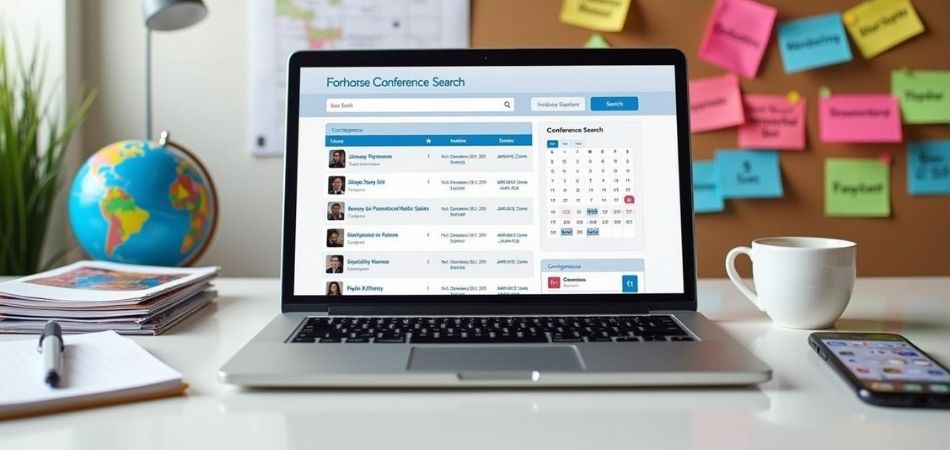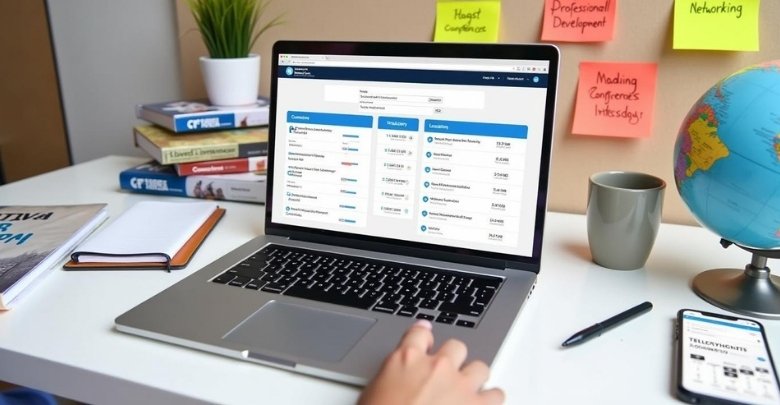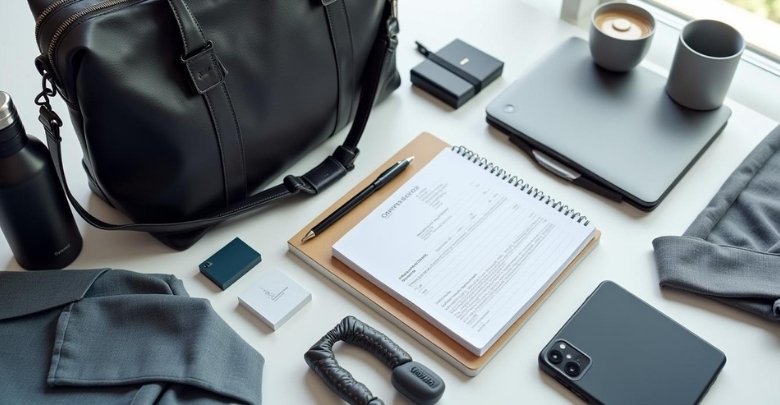Choosing the right conference is a critical decision for professionals looking to grow their expertise and network. With countless options available, the right choice ensures time and resources are well spent. But how do you explore the options and make your decision on how do I choose the right conference?
To choose the right conference, start by defining your goals. Determine whether you want to learn new skills, network, or gain insights into industry trends. Research topics, speakers, and agendas to ensure they align with your interests. Evaluate the location, timing, and cost to fit your schedule and budget effectively.
Curious about finding the best conference for your needs? This article provides all the necessary guidance to help you decide, from identifying objectives to assessing event value. Dive in to make the most informed and strategic choice for your career.
How Do I Choose the Right Conference? — A Step-by-Step Guide
Choosing the right conference can be a critical factor in advancing your professional growth and expanding your network. With so many events available, making an informed decision will ensure that you maximize your time and investment. Let’s break down the steps to help you select the perfect conference for your goals.
Step 1: Identify Your Objectives
Start by determining what you hope to achieve by attending the conference. Whether you’re aiming to network, gain new skills, or find industry insights, your goals will guide your decision. Clearly defining your objectives helps in filtering out events that may not be aligned. This step ensures you attend a conference that adds real value to your professional development.
Step 2: Research Topics of Interest
It’s essential to find conferences that cover areas relevant to your work or interests. Attending sessions on meaningful topics ensures you stay engaged and gain practical knowledge. Prioritizing events with relevant content leads to a more beneficial experience. Doing thorough research on the agenda allows you to focus on the most important opportunities.
Step 3: Consider Location and Timing
Choosing an event that fits your schedule and is in an accessible location simplifies logistics. Easy travel and convenient timing help reduce the stress and cost associated with attending. Ensure the timing works with your existing commitments to avoid last-minute hurdles. Well-planned location and timing allow you to focus on the experience rather than the details.
Step 4: Evaluate Speakers and Sessions
The quality of the speakers and sessions plays a huge role in the value of a conference. Look for experts and thought leaders who bring unique perspectives to the table. Well-curated sessions provide both inspiration and practical knowledge. A strong lineup ensures you leave with new insights and actionable ideas for your career.
Step 5: Assess Networking Opportunities
Networking is often the biggest takeaway from any conference, so it’s important to check how many opportunities are provided. Events with structured social or breakout sessions offer more chances to meet like-minded professionals. Quality networking can lead to future collaborations, partnerships, or mentorships. Prioritizing conferences with great networking boosts your professional connections.
Step 6: Review Costs and Budget
Conferences can be expensive, so it’s essential to evaluate the overall cost, including travel and accommodation. Compare the value offered by each event to its price to determine if it’s worth the investment. Prioritize conferences that provide tangible benefits for your professional growth. This ensures that your investment brings long-term returns, making it worthwhile.
Step 7: Seek Recommendations and Reviews
Recommendations and reviews from trusted colleagues or peers offer invaluable insight into the conference’s quality. Hearing from past attendees can give you an idea of the event’s atmosphere, speaker quality, and networking potential. Reviews help you decide whether the conference aligns with your expectations. This step helps in avoiding conferences that may not deliver on promises.
Why Finding the Right Conference is Important?
Finding the right conference is important for professionals seeking to grow their careers and stay ahead in their industries. The right event provides valuable insights, networking opportunities, and exposure to the latest trends and innovations.
Attending a conference customized to your field ensures that the knowledge and connections you gain are directly relevant. From workshops to expert-led sessions, the right conference can inspire ideas, sharpen your skills, and equip you with tools for success.
Conferences in the USA attract large, diverse audiences, making them ideal for networking. Exploring and participating in upcoming conferences in USA can help you access globally recognized events that connect professionals, encourage innovation, and provide actionable strategies to advance your career.
How the Right Conference Can Affect Your Growth?
Attending the right conference can significantly impact your personal and professional development. It provides unique opportunities to learn, connect, and grow within your industry. Here are some key ways the right conference can drive your success.
Expanding Your Knowledge Base
Conferences are an excellent way to gain in-depth knowledge about the latest trends, tools, and practices in your field. Expert-led sessions and workshops provide actionable insights that you can implement in your work. These learning opportunities help you stay ahead in a competitive market.
Building a Professional Network
The right conference connects you with industry leaders, peers, and potential collaborators. Structured networking sessions and informal interactions open doors to partnerships and mentorship opportunities. These connections can lead to long-term professional relationships that benefit your career or business.
Enhancing Your Skill Set
Hands-on workshops and technical sessions at conferences allow you to refine your skills. You’ll learn new techniques and approaches directly from experts, which can help you tackle challenges more effectively. These enhanced skills position you as a valuable asset in your organization or industry.
Enhancing Your Confidence and Visibility
Presenting your ideas or actively participating in discussions at conferences can increase your confidence and professional visibility. Engaging in such activities establishes you as a thought leader in your field. When evaluating ways to choose good conferences, consider those that offer speaking or panel opportunities.
Gaining Fresh Perspectives
Conferences often bring together diverse professionals, offering you fresh perspectives on industry challenges and solutions. Interacting with people from varied backgrounds sparks creativity and innovation, encouraging you to think outside the box and approach problems differently.
The right conference is a powerful catalyst for growth, providing tools, connections, and inspiration to help you achieve your goals.
What Makes a Good Conference?
The right conference can be the difference between an experience that is productive and a time that is wasted. A good conference offers more than just presentations; it brings value through meaningful content, networking, and organization. Let’s explore the qualities that make a good conference worth attending.
Engaging and Relevant Content
Attendees who attend a quality conference will find content that resonates with their specific needs and goals. Sessions should be timely, addressing current challenges within the industry. Attendees should feel they’re gaining actionable insights to apply immediately. Good content sparks curiosity and provides solutions, making the experience more impactful.
Expert and Inspiring Speakers
A good conference brings together speakers who are not only knowledgeable but also engaging and inspiring. These experts should offer fresh perspectives, pushing the boundaries of conventional thinking. Attendees should feel motivated by what they hear, with new ideas to explore. Well-chosen speakers elevate the overall value of the event.
Effective Networking Opportunities
A conference that supports meaningful connections among attendees is key to long-term value. Structured networking sessions allow professionals to build valuable relationships in their industry. Good events encourage collaboration by facilitating easy interactions between like-minded people. This leads to opportunities for future partnerships or mentorships.
Smooth and Organized Logistics
Well-organized logistics play a crucial role in making the conference enjoyable and stress-free. From registration to session schedules, everything should run smoothly and efficiently. A good conference ensures clear communication about event details to avoid confusion.
A well-designed conference balances engaging content, inspiring speakers, and seamless logistics to deliver maximum value to attendees. Exploring different ways to find conference rankings can help professionals identify events that prioritize these qualities, ensuring they choose conferences that meet their needs and expectations effectively.
What Should You Bring to a Conference?
Preparing for a conference is key to making the most of the experience. Bringing the right items can help you stay organized and maximize learning and networking opportunities. Here’s a list of essential things to bring to a conference.
- Business Cards: Having business cards on hand makes exchanging contact information quick and professional. It leaves a lasting impression when meeting new connections.
- Notebook or Tablet: Whether you prefer writing or typing, bring something to take notes. This helps you capture important insights during presentations or conversations.
- Portable Charger: With long conference days, keeping your devices charged is essential. A portable charger ensures you stay connected throughout the event.
- Comfortable Clothing: Comfortable, professional attire keeps you focused and confident during long hours. Dressing appropriately also helps you feel prepared for networking.
- Reusable Water Bottle: Staying hydrated is important, and a reusable bottle helps you avoid frequent water breaks. It’s also a sustainable option during the event.
- Pen and Backup Pen: Always carry a reliable pen, as you’ll often need it for note-taking or signing documents. A backup ensures you’re never caught off guard.
- Conference Agenda or App: Having quick access to the schedule helps you stay organized and plan your day efficiently. Many conferences now offer digital apps for this.
- Snacks: Bringing light snacks keeps your energy up between sessions. It’s especially helpful when meal breaks are far apart or rushed.
Tips to Help You Create an Effective Checklist for Conference Participation
Creating an effective checklist for conference participation ensures you’re organized, prepared, and ready to make the most of the event. By having a solid plan in place, you’ll avoid unnecessary stress and focus on the valuable aspects of the conference. Here are some tips to help you build a thorough and effective checklist.
Define Your Conference Goals
Start by identifying what you want to accomplish at the conference. Knowing your goals helps you prioritize sessions, networking, and activities. Setting specific targets ensures a focused and productive experience. This also guides the overall planning process for the event.
Plan Your Schedule in Advance
Review the conference agenda and create a personalized schedule that includes must-attend sessions. Block time for networking opportunities and breaks. Having a clear timeline helps you manage your energy throughout the day. Be flexible, as impromptu opportunities may arise during the event.
Pack Essential Supplies
Ensure you have everything needed for a productive experience, from business cards to chargers and notebooks. Packing thoughtfully prevents last-minute panic or the need to buy items onsite. Including backup supplies, like extra pens or batteries, adds peace of mind. Double-check that you have conference materials such as tickets or IDs.
Research Speakers and Attendees
Look up key speakers and attendees to gain insight into their work and interests. Preparing in advance makes conversations more meaningful and productive. Target specific people or groups you’d like to connect with. This proactive approach boosts your networking success and professional interactions.
Prepare Questions and Discussion Points
Think of insightful questions for sessions or speakers you plan to engage with. Prepared questions lead to deeper conversations and stronger connections. This shows you’re thoughtful and engaged in the topics at hand. Preparing in advance helps break the ice during discussions.
Stay Updated on Conference Announcements
Sign up for notifications or download the event app to stay informed of schedule changes or opportunities. Staying updated helps you adapt quickly to any last-minute adjustments. Knowing about impromptu events or exclusive sessions adds to your experience. These updates ensure you don’t miss out on any important opportunities.
Frequently Asked Questions
Choosing the right conference can seem overwhelming, but with the right guidance, you can make an informed decision. Below are some frequently asked questions to help you complete the process and ensure you choose the best conference for your needs.
How Can I Find Out if a Conference Is Credible?
Research the conference’s history, reputation, and organizer background to determine credibility. Look for well-known speakers, positive reviews, and notable sponsors. Checking past attendee feedback can provide additional insights into the event’s quality and value.
Should I Prioritize Virtual or In-Person Conferences?
The choice between virtual and in-person depends on your goals and availability. Virtual events offer flexibility and reduced costs, while in-person events provide stronger networking and hands-on experiences. Consider your preferences and professional needs before making a decision.
What Role Does the Conference Size Play?
Conference size impacts networking opportunities and session variety. Smaller conferences often allow for more intimate interactions, while larger ones offer broader learning options. Decide whether you prefer focused connections or diverse content when selecting the event size.
How Can I Make the Most of a Conference If I Have Limited Time?
Focus on key sessions, speakers, and networking opportunities that align with your goals. Plan your schedule ahead to maximize time at the event. Prioritize areas that offer the most value for your professional development or business needs.
Is It Worth Attending a Conference Outside My Industry?
Attending a conference outside your industry can offer fresh perspectives and innovative ideas. Cross-industry events help expand your thinking and expose you to new solutions. Ensure the topics still have some relevance to your goals or challenges.
Final Consideration
Choosing the right conference can open doors to valuable knowledge, networking opportunities, and professional growth. Start by defining your goals, researching relevant topics, and evaluating speakers and schedules. If you’re wondering how do I choose the right conference?, these steps will help you make an informed decision.
To maximize your experience, prioritize conferences that align with your needs, prepare in advance, and actively engage with attendees. Stay focused on your goals, and take full advantage of the learning opportunities. Wishing you success as you choose and attend the perfect conference to elevate your career and connections!








